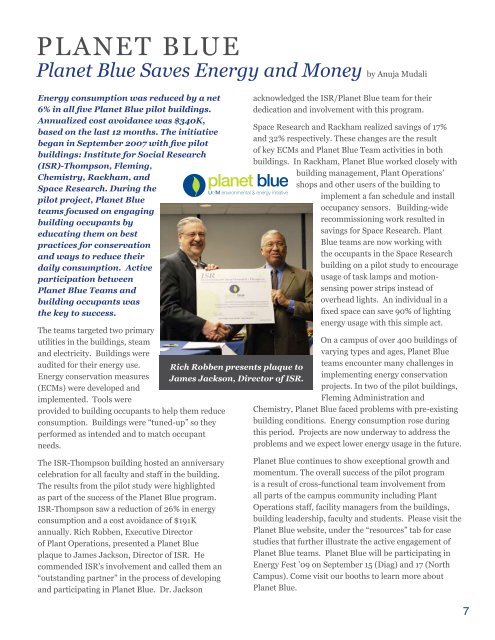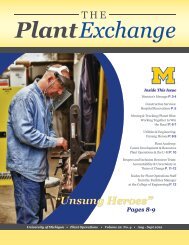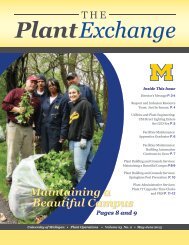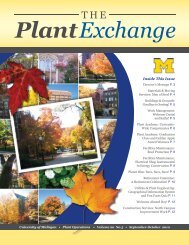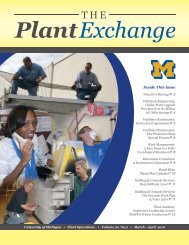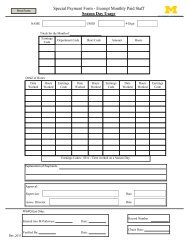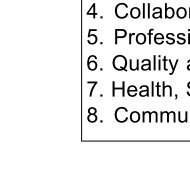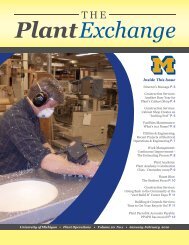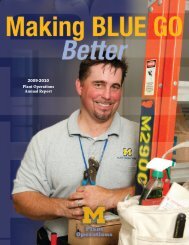Inside This Issue - Plant Operations - University of Michigan
Inside This Issue - Plant Operations - University of Michigan
Inside This Issue - Plant Operations - University of Michigan
You also want an ePaper? Increase the reach of your titles
YUMPU automatically turns print PDFs into web optimized ePapers that Google loves.
PLANET BLUE<br />
Planet Blue Saves Energy and Money by Anuja Mudali<br />
Energy consumption was reduced by a net<br />
6% in all five Planet Blue pilot buildings.<br />
Annualized cost avoidance was $340K,<br />
based on the last 12 months. The initiative<br />
began in September 2007 with five pilot<br />
buildings: Institute for Social Research<br />
(ISR)-Thompson, Fleming,<br />
Chemistry, Rackham, and<br />
Space Research. During the<br />
pilot project, Planet Blue<br />
teams focused on engaging<br />
building occupants by<br />
educating them on best<br />
practices for conservation<br />
and ways to reduce their<br />
daily consumption. Active<br />
participation between<br />
Planet Blue Teams and<br />
building occupants was<br />
the key to success.<br />
The teams targeted two primary<br />
utilities in the buildings, steam<br />
and electricity. Buildings were<br />
audited for their energy use.<br />
Energy conservation measures<br />
(ECMs) were developed and<br />
implemented. Tools were<br />
provided to building occupants to help them reduce<br />
consumption. Buildings were “tuned-up” so they<br />
performed as intended and to match occupant<br />
needs.<br />
The ISR-Thompson building hosted an anniversary<br />
celebration for all faculty and staff in the building.<br />
The results from the pilot study were highlighted<br />
as part <strong>of</strong> the success <strong>of</strong> the Planet Blue program.<br />
ISR-Thompson saw a reduction <strong>of</strong> 26% in energy<br />
consumption and a cost avoidance <strong>of</strong> $191K<br />
annually. Rich Robben, Executive Director<br />
<strong>of</strong> <strong>Plant</strong> <strong>Operations</strong>, presented a Planet Blue<br />
plaque to James Jackson, Director <strong>of</strong> ISR. He<br />
commended ISR’s involvement and called them an<br />
“outstanding partner” in the process <strong>of</strong> developing<br />
and participating in Planet Blue. Dr. Jackson<br />
Rich Robben presents plaque to<br />
James Jackson, Director <strong>of</strong> ISR.<br />
acknowledged the ISR/Planet Blue team for their<br />
dedication and involvement with this program.<br />
Space Research and Rackham realized savings <strong>of</strong> 17%<br />
and 32% respectively. These changes are the result<br />
<strong>of</strong> key ECMs and Planet Blue Team activities in both<br />
buildings. In Rackham, Planet Blue worked closely with<br />
building management, <strong>Plant</strong> <strong>Operations</strong>’<br />
shops and other users <strong>of</strong> the building to<br />
implement a fan schedule and install<br />
occupancy sensors. Building-wide<br />
recommissioning work resulted in<br />
savings for Space Research. <strong>Plant</strong><br />
Blue teams are now working with<br />
the occupants in the Space Research<br />
building on a pilot study to encourage<br />
usage <strong>of</strong> task lamps and motionsensing<br />
power strips instead <strong>of</strong><br />
overhead lights. An individual in a<br />
fixed space can save 90% <strong>of</strong> lighting<br />
energy usage with this simple act.<br />
On a campus <strong>of</strong> over 400 buildings <strong>of</strong><br />
varying types and ages, Planet Blue<br />
teams encounter many challenges in<br />
implementing energy conservation<br />
projects. In two <strong>of</strong> the pilot buildings,<br />
Fleming Administration and<br />
Chemistry, Planet Blue faced problems with pre-existing<br />
building conditions. Energy consumption rose during<br />
this period. Projects are now underway to address the<br />
problems and we expect lower energy usage in the future.<br />
Planet Blue continues to show exceptional growth and<br />
momentum. The overall success <strong>of</strong> the pilot program<br />
is a result <strong>of</strong> cross-functional team involvement from<br />
all parts <strong>of</strong> the campus community including <strong>Plant</strong><br />
<strong>Operations</strong> staff, facility managers from the buildings,<br />
building leadership, faculty and students. Please visit the<br />
Planet Blue website, under the “resources” tab for case<br />
studies that further illustrate the active engagement <strong>of</strong><br />
Planet Blue teams. Planet Blue will be participating in<br />
Energy Fest ’09 on September 15 (Diag) and 17 (North<br />
Campus). Come visit our booths to learn more about<br />
Planet Blue.<br />
7


